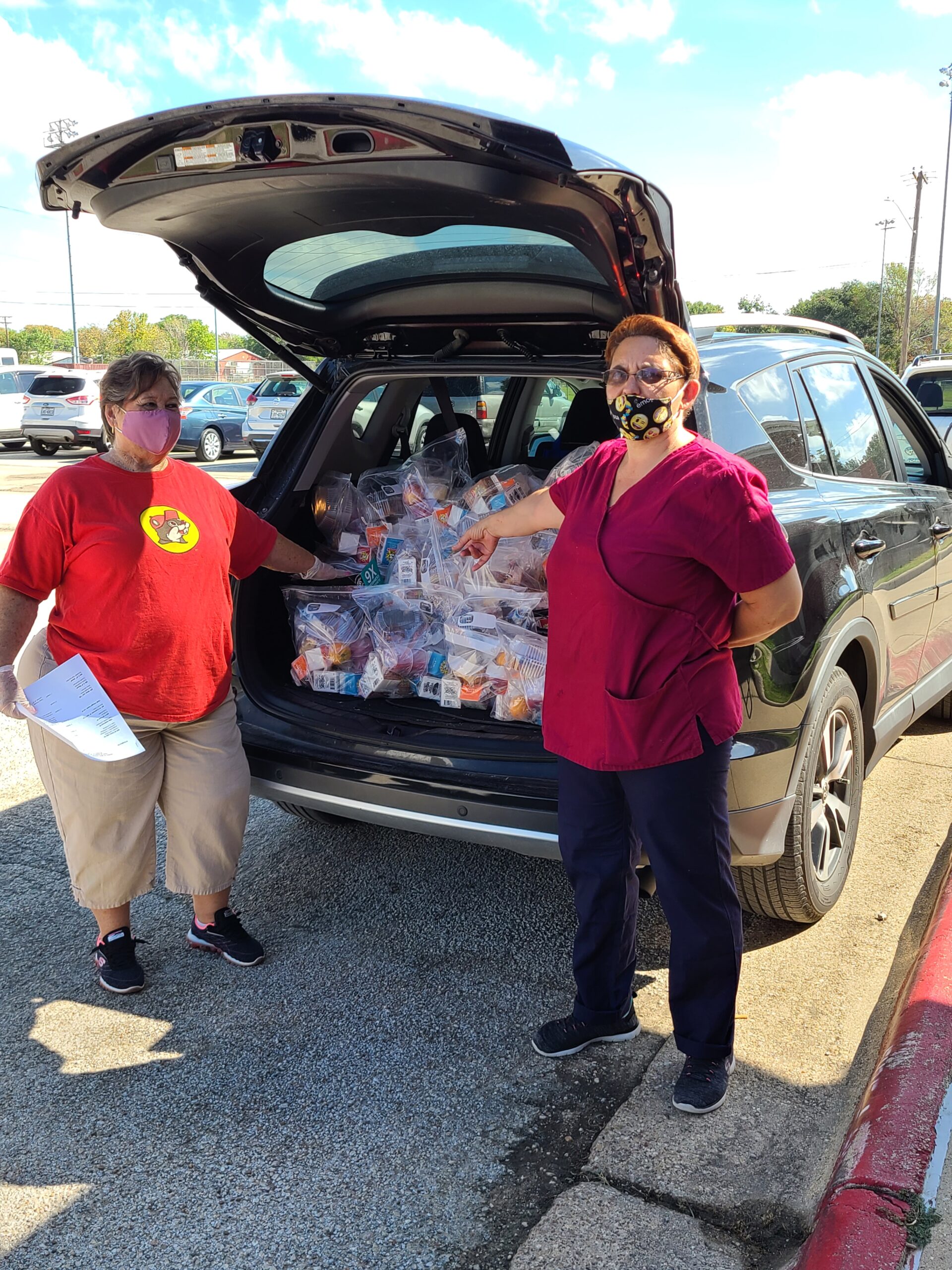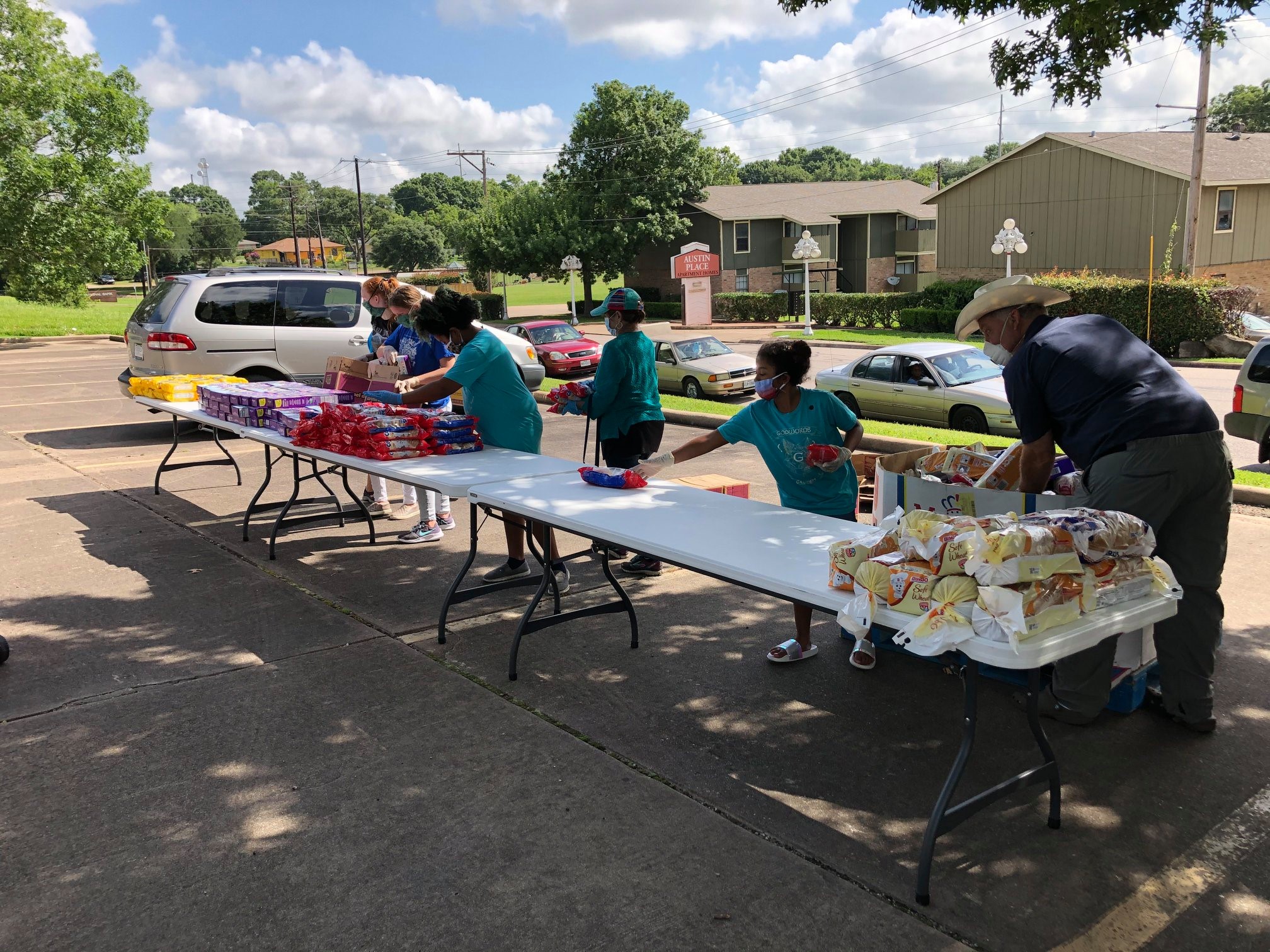St. John’s, Sealy; St. Philip’s, Hearne; and St. Peter’s, Brenham, are all small parishes with huge hearts. Prior and during the pandemic, these three congregations have fused their efforts with local organizations to help feed those who are facing hardships. These endeavors have only gained momentum during these uncertain times.
St. John’s, Sealy
St. John’s, Sealy, located just west of Katy, TX, has expanded their food programs as they work alongside Sealy Meals on Wheels by distributing food to the neediest. They also contribute funds to the Sealy Ministerial Alliance program and support individuals who request aid directly from St. John’s.
According to the Rev. Eric LeBrocq, these programs have been in existence from a few years to several decades. The Sealy Food Program, for example, was started by one of their parishioners.
During the pandemic, St. John’s parishioners have distributed approximately 1,000 meals as part of the Meals on Wheels program. The parish also purchased and distributed approximately 126 weeks of food for residents in need at the Sealy Housing and Urban Development (HUD) facility.
“Thanks to a Diocese of Texas ECW Grant we were able to provide sanitary supplies to females,” said LeBrocq.
St. Philip’s, Hearne
 Just outside of Bryan/College Station you can find St. Philip’s, Hearne, another micro parish—with average attendance of 20 before the pandemic—that offers an abundance of support to their community.
Just outside of Bryan/College Station you can find St. Philip’s, Hearne, another micro parish—with average attendance of 20 before the pandemic—that offers an abundance of support to their community.
“Our tiny parish offers a calming presence in the midst of uncertainty. One of our assets is the ability to be creative and flexible enough to meet those in need and find ways to walk with them through hard times,” said the Rev. Melva Charlotte Love, a vocational deacon who works in collaboration with the Rev. Nandra Perry, D.Min., vicar of the same congregation.
According to Love, before the pandemic, St. Philip’s was already dealing with food insecurity. In 2018, they established a sidewalk pantry as a “neighbor helping neighbor” entity. The pantry sat in front of St. Philip’s and was filled with basic canned good and non-perishables.
“The idea was to take what you need and/or add to the pantry when you are able,” added Love.
On March 20, 2020, St. Philip’s and the Hearne community faced another unpredictable hardship—it was the day Hearne ISD went into lock down, forcing many children to stay home and with no access to school breakfast and lunch.
Love shared that although the school provided the meals as a Grab & Go drive through program twice a week, many were latchkey children of blue-collar essential workers or simply had no transportation.
This didn’t become an impediment for Love. She contacted Rhonda Cloud, head of Hearne ISD Food Services and offered the assistance to make meals available by home delivery. They managed to provide a safe protocol against COVID-19. From March to June, members of the parish took turns delivering meals to the children. By May, they were delivering 60 meals to 24 homes twice a week.
As the end of the school year loomed, Love and volunteers began to look for ways to continue providing food to children through the summer. St. Philip’s partnered with the Brazos Valley Food Bank and were granted permission and allowed to receive, store and distribute 200 meal packets a month. They were able to provide curbside pickup and home delivery with additional help from volunteers and other churches.
“This is what it’s all about, not just one church meeting a need, but the entire community coming together and working together,” said Love.
St. Peter’s, Brenham
St. Peter’s, Brenham, located just between Houston and Austin is another parish that had to redefine their efforts to help local families during the pandemic.
About a year ago, the parish had also partnered up with the Brazos Valley Food Bank and were providing a once-a-month drive-thru pantry. Since this was already taking place outdoors, volunteers just had to ensure that they implemented infection control precautions and give face masks to those who showed up without one.
“We had a team of sewers at the church that cranked up their machines and provided us with cloth masks for the community,” said the Rev. Carol Peterson, deacon of St. Peter’s.
Although Washington County has a small population base with approximately 34,500 residents, according to Peterson, 25% of the county is considered to be food insecure based on their annual income.
Peterson shares St. Peter’s has helped thousands of people since the start of the pandemic.
“While we knew that at the start of the pandemic some food pantries in other counties had closed their doors—that was never an option for our volunteers,” said Peterson. “It was important for us to assure them that we would continue to be there for them as usual.”
Peterson also shares St. Peter’s has always had a heart for the community and that their on-site pantry has existed for about 10 years. Three years ago, St. Peter’s played a pivotal role in starting a county level food security coalition, where they have invited other local churches. Organizations such as the local Boys and Girls Club and the regional food bank have become key players.
“Our biggest success is that when the pandemic hit, our coalition was already in place. We didn’t panic. We were able to support each other and share information and resources so that everyone was well-positioned to address whatever surprises the pandemic might throw at us,” said Peterson.
